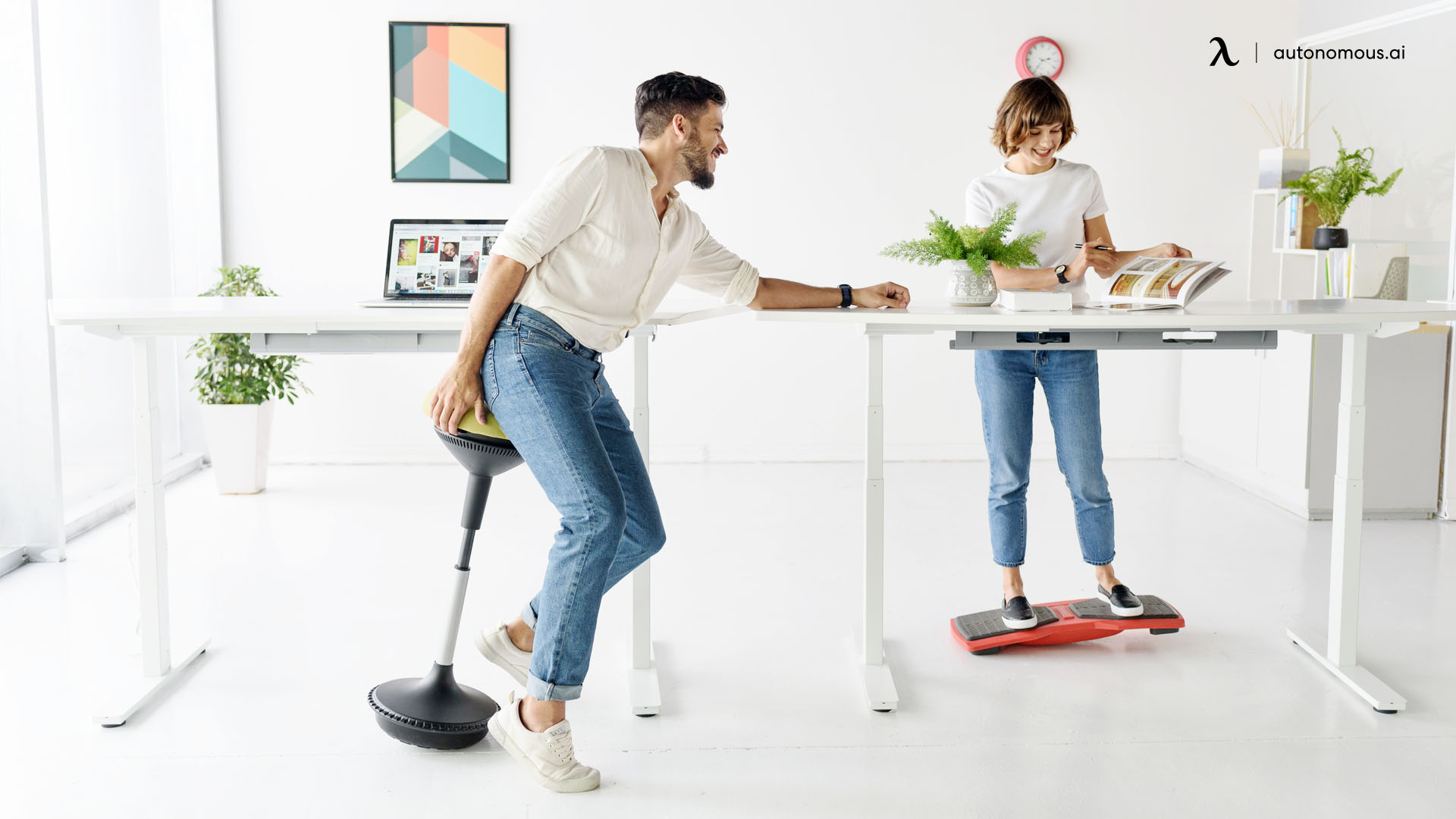
Table of Contents
A sedentary work routine can take a serious toll on both your body and mind. Long hours of sitting are linked to weight gain, back pain, diabetes, and even heart disease. That’s why many professionals are turning to standing desks for health—a simple change that delivers big results.
The health benefits of a standing desk go far beyond burning a few extra calories. From improving posture and circulation to boosting mood and productivity, the benefits of having a standing desk make it one of the smartest upgrades you can bring into your workspace.
In this guide, we’ll break down what is the benefit of a standing desk, explore the key standing desk advantages backed by research, and show you how to use one correctly so you can get the most out of it.
What Is a Standing Desk?
A standing desk, sometimes called a sit-stand desk, height-adjustable desk, or stand-up desk, is a workstation designed to let you work while standing instead of sitting. Unlike a traditional desk, it can be adjusted to different heights so you can alternate between sitting and standing throughout the day.
There are several types of standing desks available:
- Fixed-height standing desks – remain at a set height, usually best for dedicated standing workstations.
- Adjustable standing desks – manual or electric desks that let you switch easily between sitting and standing positions. If you’re looking for a simpler option without motors, a non-electric standing desk can be a reliable and budget-friendly choice.
- Desk converters – portable units that sit on top of your existing desk, allowing you to raise or lower your work surface without replacing the entire desk. A standing desk extension is especially useful if you want flexibility without committing to a full desk replacement.
The purpose of a standing desk is simple: to reduce the amount of time you spend sitting and add more movement to your daily routine. Over time, this small change can have a big impact on your posture, comfort, and long-term health. If you’re curious how it compares to a traditional setup, this guide on standing desk vs sitting desk breaks down the differences in detail.
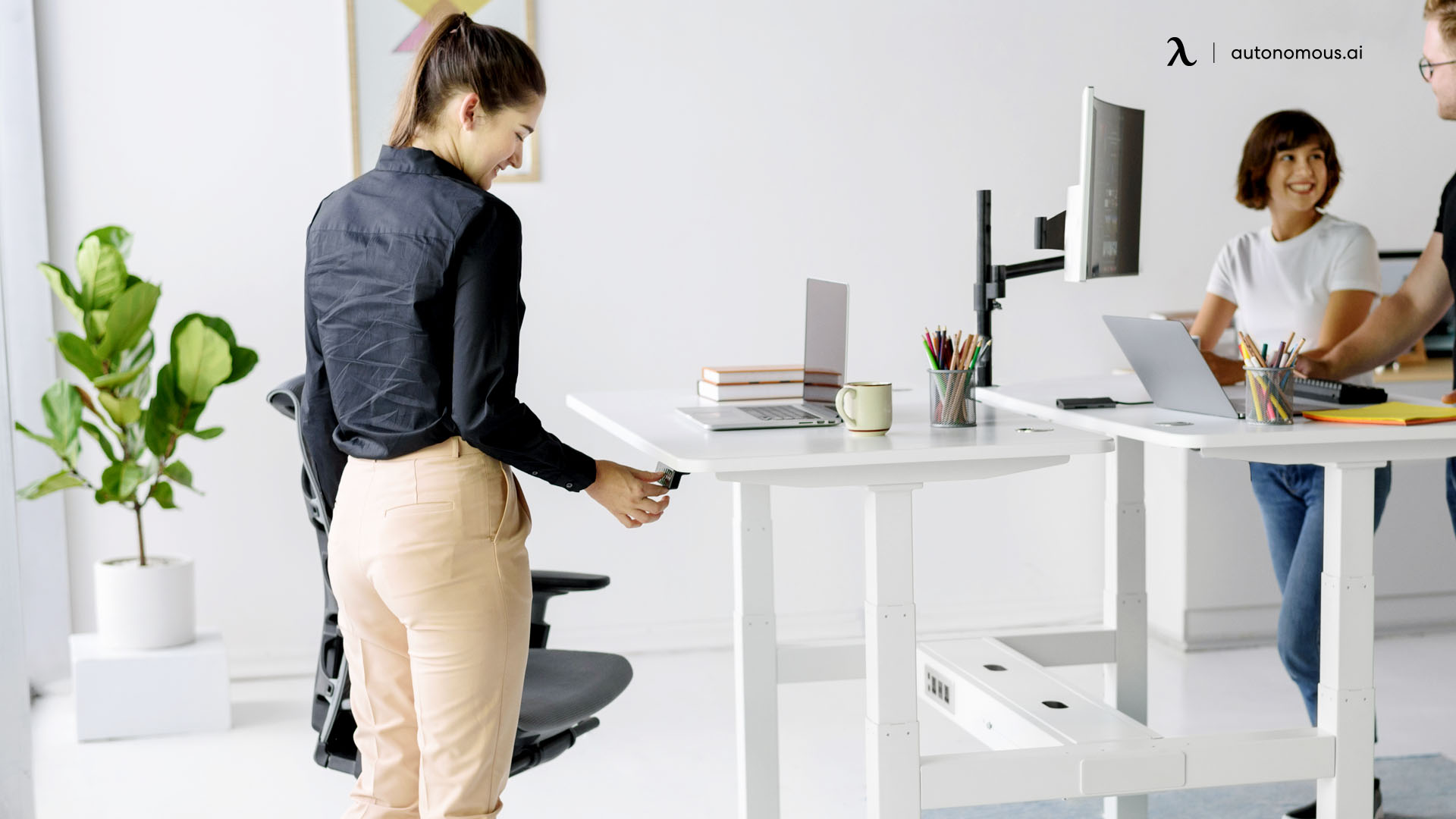
Health Benefits of a Standing Desk for Body and Mind
Are standing desks good for your health? Research and user experience both point to yes. By reducing sedentary time, they address many of the risks linked to desk jobs—from obesity and diabetes to fatigue and chronic pain. Below are the most important health benefits of a standing desk you’ll notice when you make the switch.
1. Reduces the Risk of Weight Gain and Obesity
Sitting for long stretches slows your metabolism. Standing burns more calories per hour, and over time, that small difference adds up. Many professionals now use a standing desk for weight loss as part of their daily routine, since it helps counteract the sedentary lifestyle that comes with desk jobs.
If you’ve ever asked yourself does standing desk burn calories, the answer is yes—but it works best when combined with small activities. Even light movements like tapping your feet, shifting weight, or walking in place can significantly boost calorie burn.
You can take this further by adding standing desk exercises into your routine. Simple stretches, squats, or desk-friendly marches keep your muscles engaged and help you stay energized throughout the day.
The right gear also makes a difference. For example, using a floor pad for standing desk prevents leg fatigue during longer sessions, while a best balance board for standing desk adds gentle movement that improves core strength. If you want to transform your workstation into an active zone, even a standing desk for treadmill can turn office hours into walking time.
Finally, a well-designed setup with supportive standing desk accessories helps you create a space that encourages consistency—so the calorie-burning benefits become a long-term habit, not just a short burst of motivation.
2. May Lower Blood Sugar Levels
Standing after meals reduces post-lunch blood sugar spikes, especially in people with insulin resistance or diabetes. Studies show alternating between sitting and standing every 30 minutes can cut glucose surges by over 10%.

3. Supports Heart Health
Too much sitting has long been tied to a higher risk of heart disease. According to a Harvard Health blog summarizing findings from the Australian Diabetes, Obesity and Lifestyle Study, spending less time sitting and more time standing helps lower blood sugar, cholesterol, and weight—all key risk factors for heart disease
4. Improves Circulation
Standing promotes better blood flow to your legs and feet. In contrast, prolonged sitting can slow circulation and lead to swelling, varicose veins, or even blood clots. A study published in the Journal of Applied Physiology found that uninterrupted sitting for hours significantly reduces blood flow in the legs, while short movement breaks help restore healthy circulation.
Mixing in standing sessions and regular movement breaks keeps circulation strong. You can also ease pressure on your legs by using accessories like floor pads or ergonomic mats. For more practical advice, see this guide on how to prevent feet swelling while sitting at your desk.
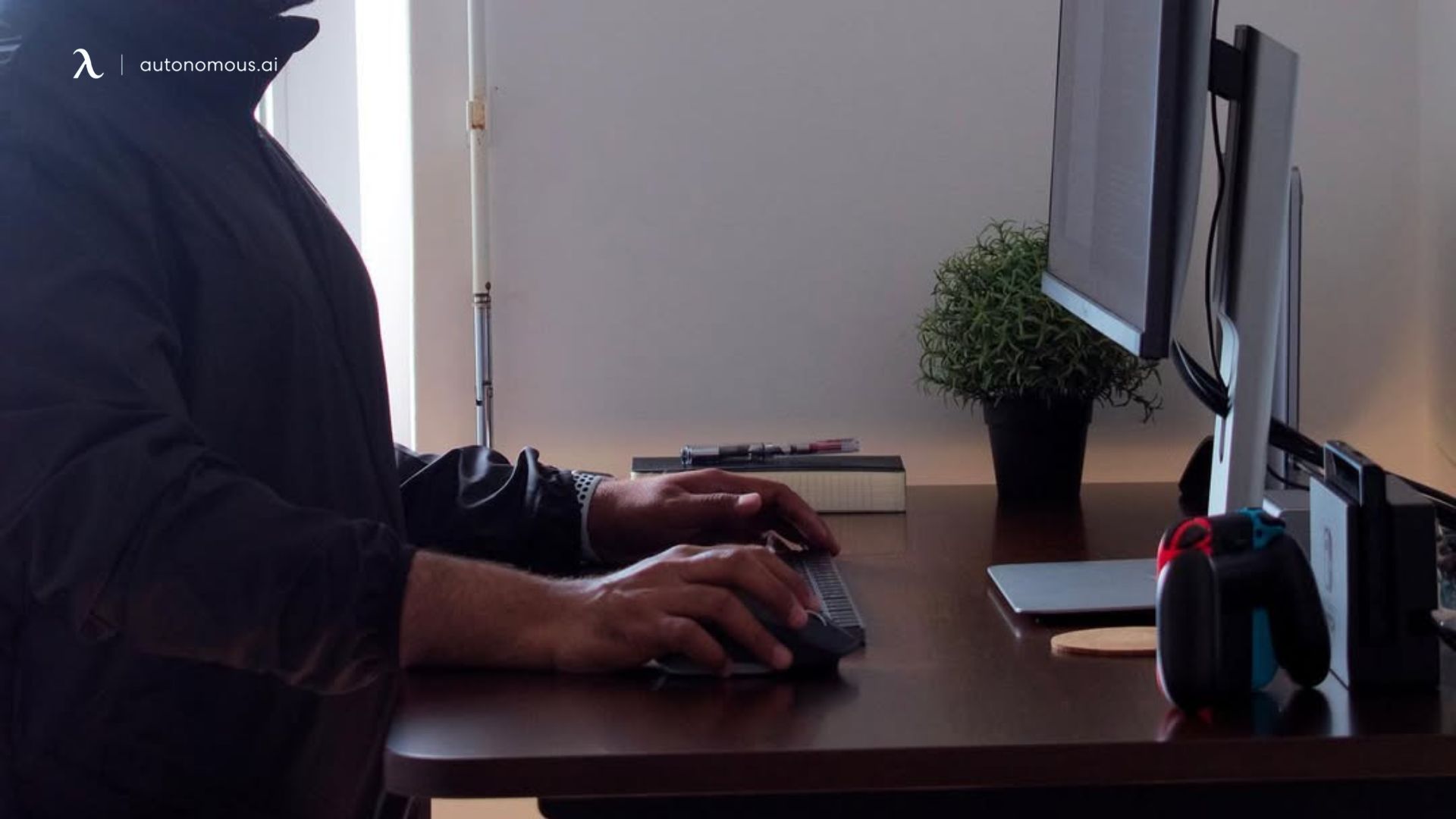
5. Relieves Neck and Back Pain
Poor sitting posture is a major cause of neck and back discomfort in office environments. Using a standing desk encourages better spinal alignment and helps reduce strain on your shoulders, neck, and lower back. A systematic review and meta-analysis found that sit-stand workstations are associated with a meaningful reduction in low back pain, with effect sizes ranging from –0.30 to –0.51 on a 10-point pain scale—showing clear ergonomic benefits compared to prolonged sitting.
Alternating between sitting and standing throughout the day helps distribute pressure and reduces muscle fatigue. Many workers also find that using a standing desk for back pain provides additional relief when combined with proper posture and regular movement.
6. Boosts Mood and Energy
Beyond the physical benefits, standing also helps fight fatigue. Many users report higher energy levels, less stress, and better overall well-being after switching to a sit-stand routine. These mood improvements often lead to stronger engagement at work.
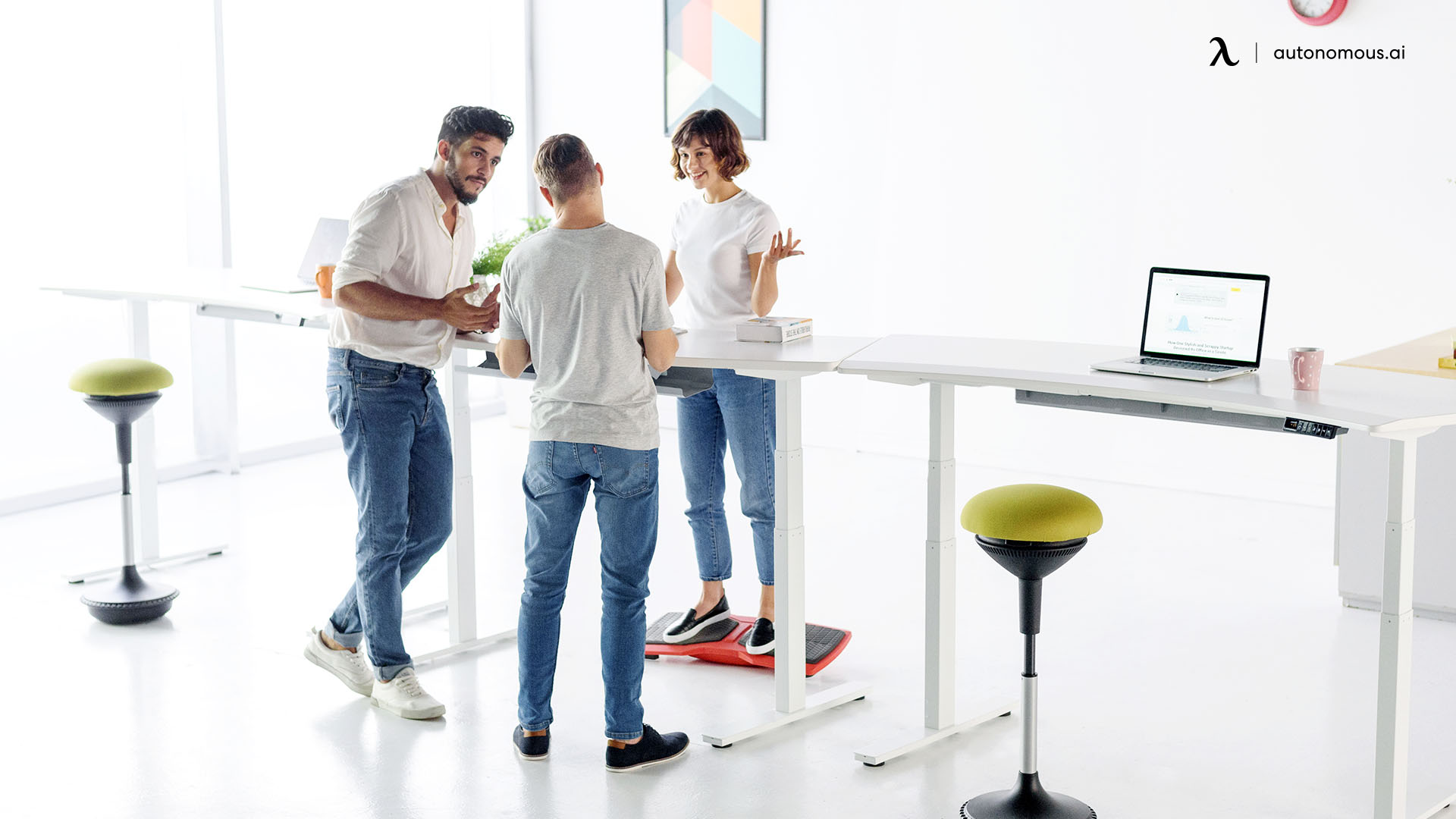
7. Enhances Productivity
Some worry that standing might slow down tasks like typing or writing, but studies show otherwise. By reducing pain and boosting energy, a standing desk actually makes it easier to stay focused and productive throughout the day.
A balanced routine of sitting and standing also contributes to a more productive work environment, where energy and focus remain steady instead of dipping into fatigue or distraction.
8. Improves Posture
A standing desk advantage is its ability to promote healthier alignment. By setting your desk and monitor at the right height, you reduce slouching and neck strain. Over time, this contributes to stronger posture habits whether you’re sitting or standing.
Developing these habits depends on setup as much as usage. Following guidelines for standing desk posture ensures your workstation supports proper alignment whether you’re sitting or standing.
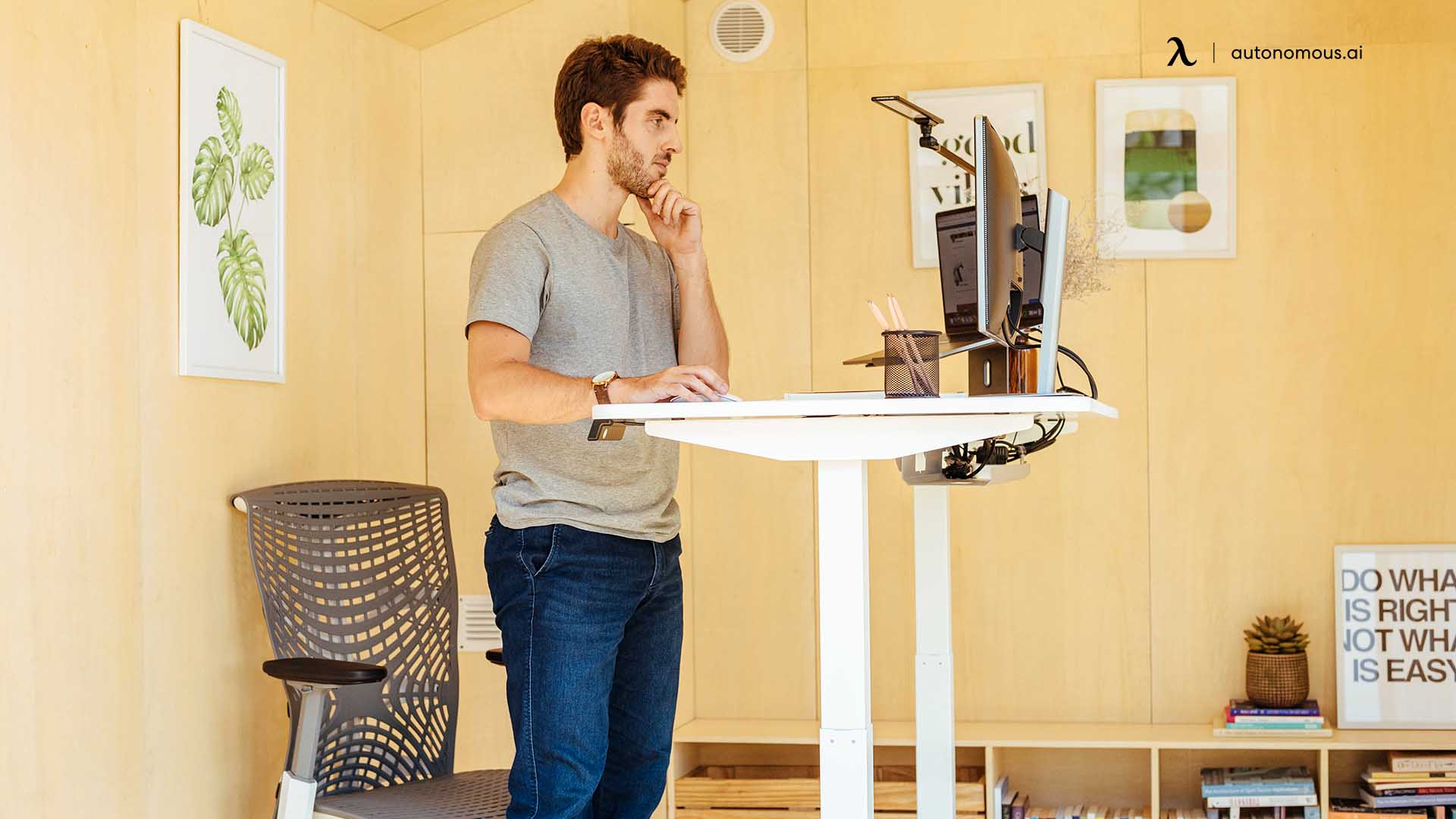
9. May Help You Live Longer
Reducing sedentary time lowers your risk of chronic illness, which can increase life expectancy. When used correctly, the benefits of having a standing desk go beyond the office—they support better long-term health and quality of life.
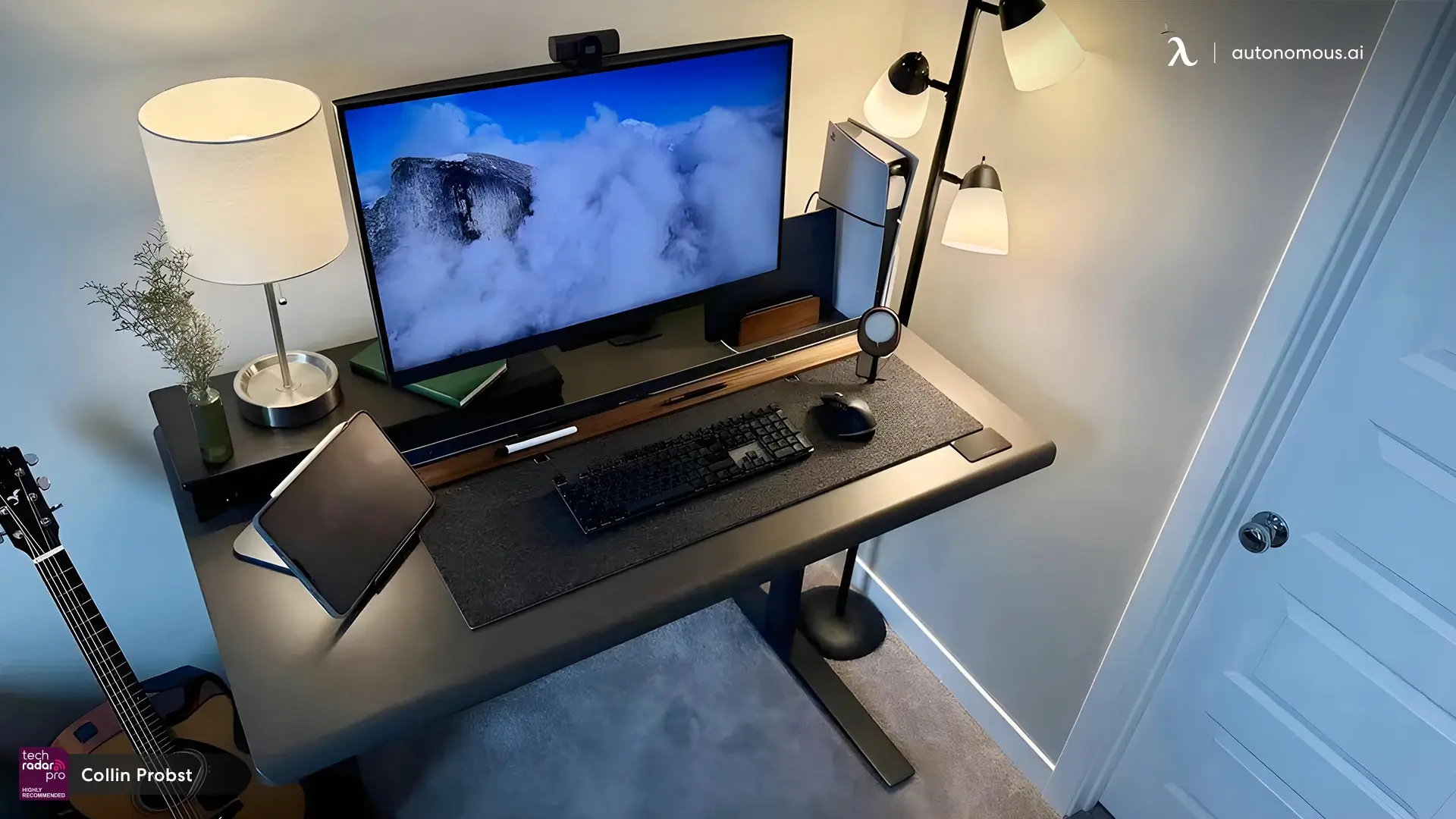
Autonomous Desk 5
| Dimensions | 53"L x 29"W x 1.2"H |
|---|---|
| Colors | Stone Desert, Titanium White, Meteor Grey |
| Coating | Special customize sealing paint based on Green Standard |
| Material | HDF wood |
| Motor type | Dual |
|---|---|
| Lifting speed | 1.2”/sec |
| Lifting capacity | 330 lbs |
| Noise level | 40 dB |
| Height range (without top) | 29.5" - 48.5" |
| Height range (with top) | 30.7" - 49.7" |
| Length range | 40.4" - 70.9" |
| Frame foot width | 26.4" |
| Material | SPCC steel |
| Colors | Stone Desert, Titanium White, Meteor Grey |
| Outlet voltage | 110-240V |
| Anti - collision | Yes |
| Motor type | Dual |
|---|---|
| Lifting speed | 1.6”/sec |
| Lifting capacity | 330 lbs |
| Noise level | 40 dB |
| Height range (without top) | 26" - 51.5" |
| Height range (with top) | 27.2" - 52.7" |
| Length range | 40.4" - 70.9" |
| Frame foot width | 26.4" |
| Material | SPCC steel |
| Colors | Stone Desert, Titanium White, Meteor Grey |
| Outlet voltage | 110-240V |
| Anti - collision | Yes |
FAQs
What is the benefit of a standing desk?
A standing desk helps reduce sedentary time, improve posture, boost energy, and lower health risks such as obesity, diabetes, and heart disease.
What are the health benefits of a standing desk at work?
The main health benefits include reduced back and neck pain, better circulation, improved mood, more energy, and higher productivity during the workday.
Do standing desks really improve posture?
Yes. When adjusted correctly, a standing desk promotes proper alignment of your spine, neck, and shoulders, helping you avoid slouching and long-term posture issues.
How many hours should you use a standing desk?
Experts recommend alternating between sitting and standing every 30–60 minutes. A balanced sit-stand routine is healthier than standing all day.
Does a standing desk burn calories?
Yes, standing burns more calories than sitting—on average, about 50–100 extra calories per hour. Adding small movements, like stretching or marching in place, increases this effect.
Is a standing desk better than sitting all day?
Yes. Standing desks reduce the risks linked to prolonged sitting, such as back pain and poor circulation. However, the best approach is to combine sitting, standing, and movement throughout the day.
What accessories make a standing desk more comfortable?
Anti-fatigue mats, monitor risers, ergonomic chairs or stools, and proper footwear can all make standing desks more comfortable and support good posture.
Are standing desks good for your health long term?
Yes. Long-term use of a standing desk can lower the risk of chronic conditions linked to sitting too much, such as type 2 diabetes and cardiovascular disease.
Can standing desks reduce back pain?
Many people report less back pain after switching to a standing desk. Alternating between sitting and standing relieves pressure on the spine and supports better posture.
What is the best way to use a standing desk?
The best way is to alternate between sitting and standing, keep your monitor at eye level, and position your desk so your elbows rest at a 90-degree angle.
Do standing desks improve circulation?
Yes. Standing encourages better blood flow compared to sitting, which can reduce swelling in the legs and lower the risk of circulation-related issues.
Can standing desks improve productivity?
Indirectly, yes. Standing desks help reduce fatigue and discomfort, which makes it easier to stay focused and productive throughout the day.
Are electric standing desks worth it?
Electric standing desks are more convenient because you can change height with the push of a button. They’re ideal for people who plan to switch positions frequently during the workday.
Do I need an anti-fatigue mat with a standing desk?
An anti-fatigue mat is highly recommended. It reduces strain on your legs and feet, encourages subtle movement, and makes standing for long periods more comfortable.
Can I use a standing desk in a small home office?
Yes. Compact and L-shaped standing desks are available, and desk converters can transform your existing desk into a sit-stand setup without taking extra space.

Conclusion
The bottom line? Sitting all day isn’t doing your body—or your focus—any favors. A standing desk helps break that cycle, giving you more energy, better posture, and long-term health benefits. Whether you choose a manual or electric model, the real advantage comes from building a routine that balances sitting and standing throughout your day.
Making the most of this setup also comes down to technique. Knowing how long you should stand at a standing desk and how often you should stand up from your desk helps you avoid fatigue while keeping circulation active. Equally important is desk setup: details like how tall a standing desk should be or using a standing desk height calculator ensure proper alignment and posture support.
Investing in a standing desk is more than just a trend—it’s a proven way to improve your well-being at work, reduce discomfort, and create a healthier, more productive workspace. The benefits of a standing desk at work make it one of the smartest choices you can make for your health today.
Spread the word
.svg)


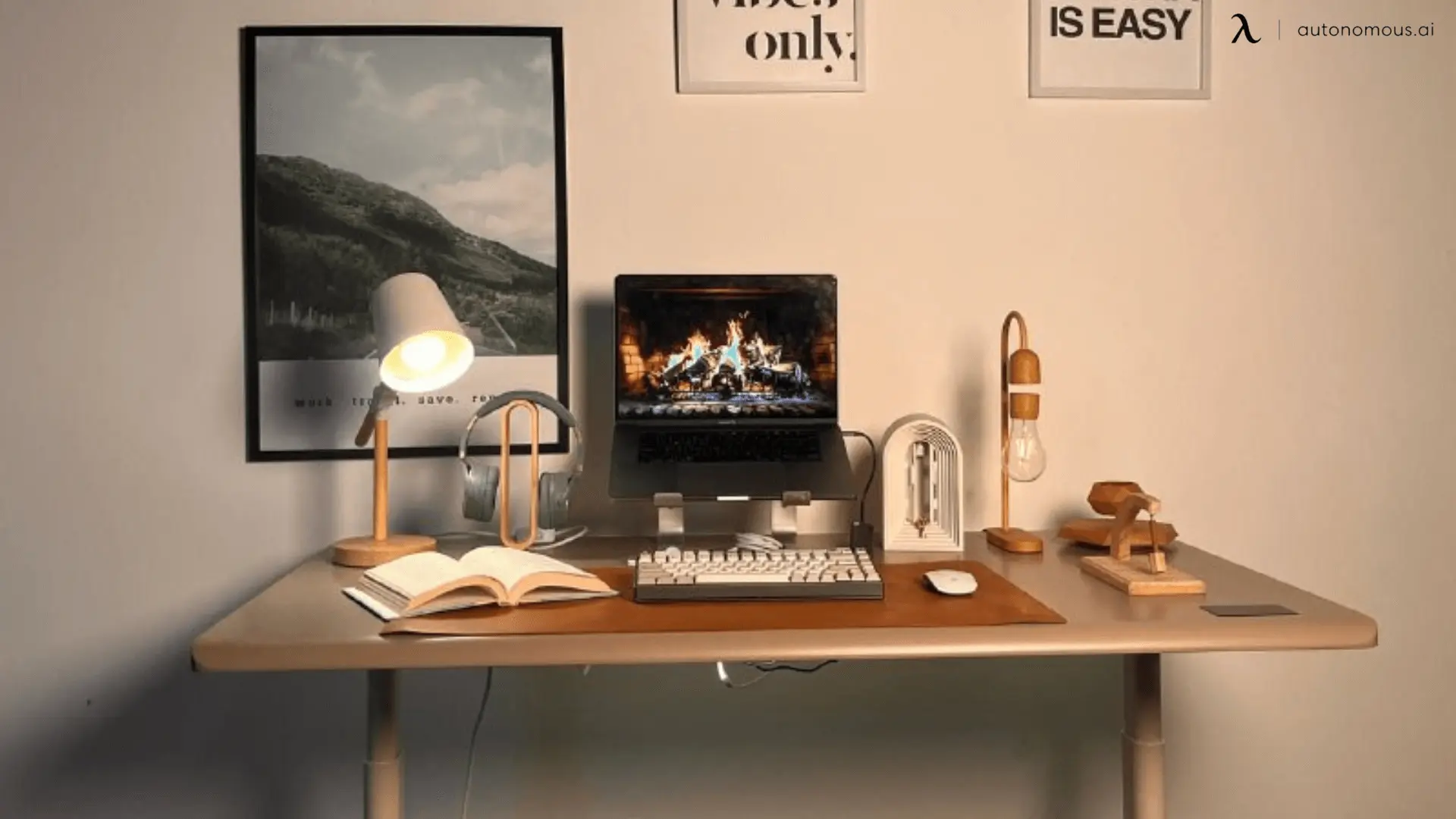
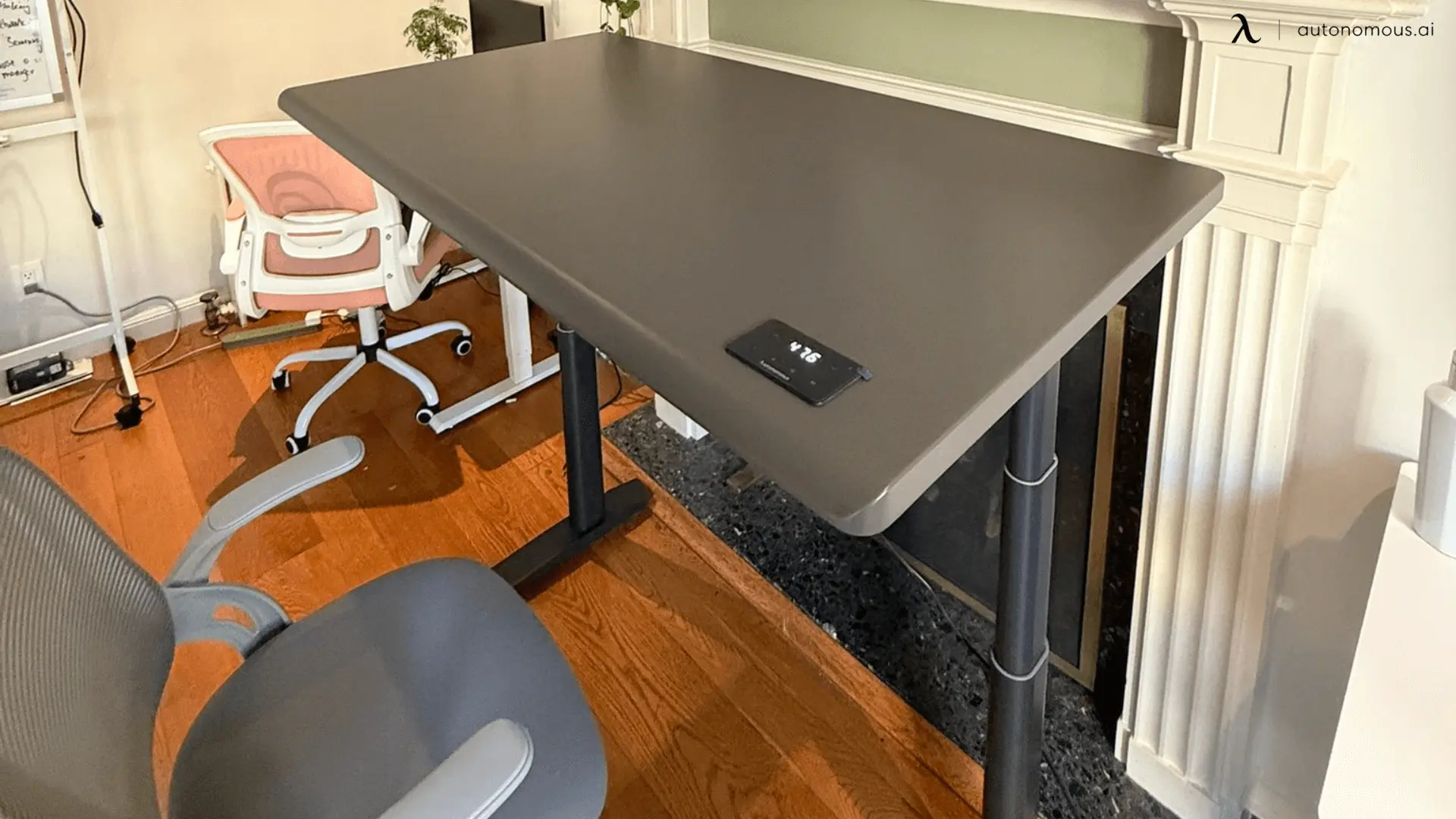
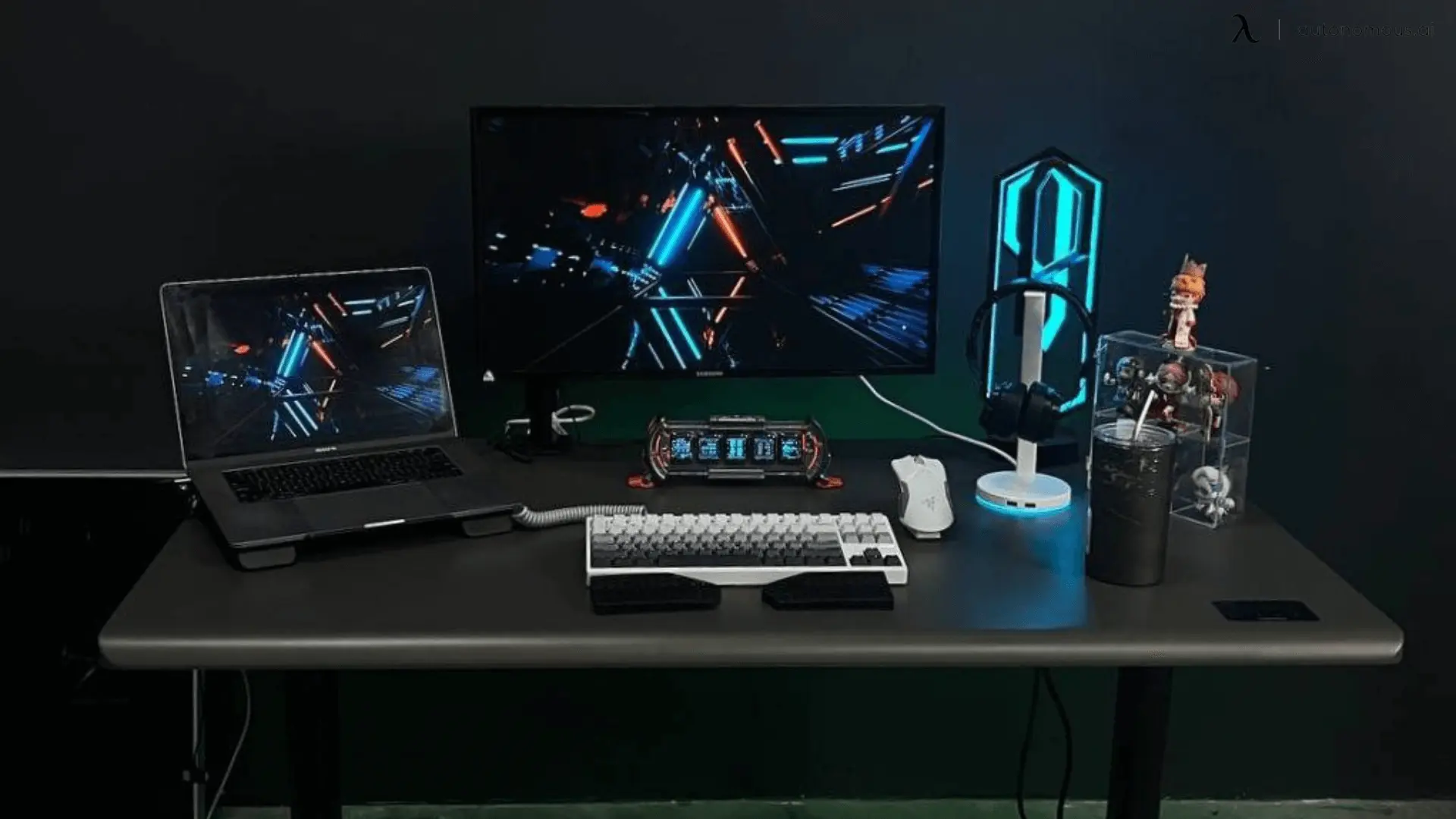
.webp)
.webp)




